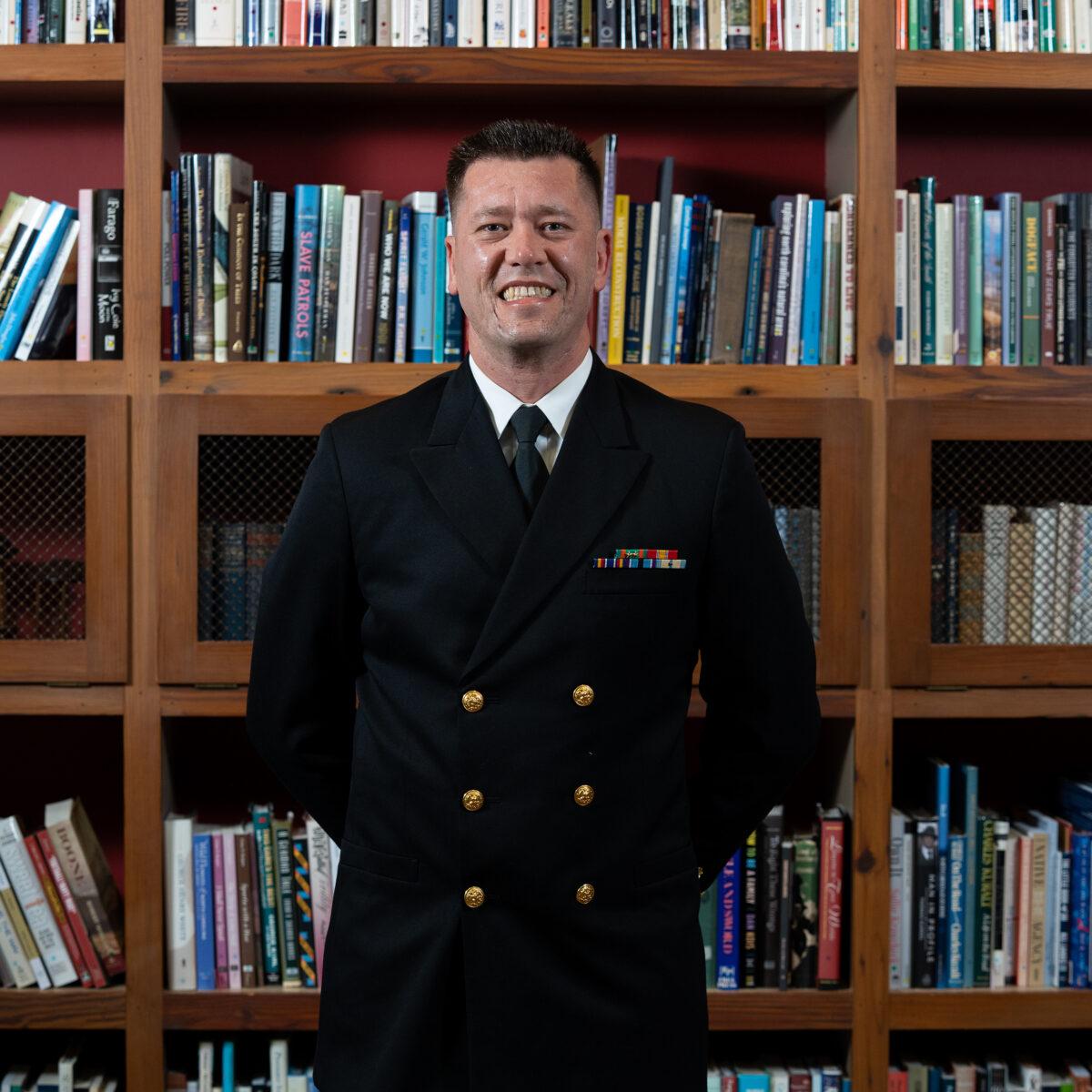Michael Bury ’17 (MSN), Distinguished Young Alumnus Award Citation
Posted on April 22, 2024
Michael Bury ’17 (MSN). Photo by Ray Black III
Michael Bury ’17 (MSN), a nurse, a lieutenant commander in the Navy Reserve and an assistant professor on UNC’s School of Nursing faculty, works with what he has to create what he needs. His adaptability and creativity saved lives when he and the Reserve nursing unit he led were deployed to a New York City hospital in the epicenter of the COVID-19 pandemic in April 2020. At the time, no one knew how the virus spread or how to keep it from being so deadly. In the midst of the chaos, a public hospital overrun with critically ill patients in a low-income, multicultural neighborhood in Queens needed another ICU. Bury set one up and ran it in battlefield conditions.
If your health fails you, hope that your nurse was trained by Bury. Nurses emerge from his classes with the competency to handle any obstacle life throws in their path and with the tools to manage the stress of a job that is physically and emotionally draining. As the BSN Military Pathway Coordinator, he teaches some of the most difficult courses in the nursing curriculum and makes sure his students learn from the textbook and real-life situations he’s encountered firsthand. He has a reputation as a rigorous instructor, yet he makes time for extra tutoring. He mentors his students as he does his corpsmen. In 2021, the School of Nursing students voted to give him the Unsung Hero Award.
His life journey shows that persistence and hard work can pay off.
Bury’s family didn’t support his choice to go to college and become a nurse, preferring he follow the rest of the men in his family into the trucking business. He had to move out and fend for himself while he took classes part time at Coastal Carolina Community College near his home in Jacksonville. After he earned his associate’s degree in 2009, he persevered at UNC-Wilmington through the skepticism of some instructors who didn’t think a man could be a good nurse. Once he had his bachelor’s of science in nursing, he was commissioned in the Navy Reserve while practicing his specialty of adult critical care. He completed his master’s degree at UNC and certificate in nursing education just as he and his wife, Keiko Bury, welcomed their first child. He completed his doctorate in nursing practice at Duke in 2021.
The School of Nursing hired Bury as a part-time clinical instructor, then offered him a full-time position. He became faculty adviser for the Association of Nursing Students’ UNC chapter and for the Aspiring Critical Care Nurses Student Association. Just as he’d settled into that rhythm, he and his wife said yes to the opportunity to buy Carrboro Family Pharmacy, where Keiko worked as a pharmacist.
All the while, Bury continued to fulfill his reservist obligations as the officer in charge of a unit in Charlotte. He’s the assistant specialty leader for critical care nursing for the Navy Reserve. Sometimes his unit would practice setting up field emergency and operating rooms for a Marine battalion. (The Navy manages health-care capabilities for the Marines.) At other times, his nursing corps would be deployed to hospitals to fill in while hospital personnel left on deployments.
When COVID slammed into New York City, Bury’s unit had barely a day to prepare, and they didn’t know how long they’d be deployed. They arrived at Elmhurst Hospital, which had a 50-bed capacity before COVID but had swelled to 250 patients, 160 of them on ventilators. Multi-generations lived together in tight quarters, and the virus spread rapidly. City leaders implored residents not to go to the hospital unless they were critically ill, and some who arrived never made it out of the ER alive.
Bury and his team transformed a post-surgical unit into a fully functioning ICU. Elmhurst had no negative pressure rooms, so the nurses set up exhaust fans in front of open windows to draw out the inside air. To limit the virus aerosolizing indoors, nurses put plastic bags over patients’ heads to contain the air exhaled from the ventilators.
The reality of what was happening around the world was harsh and sad. Bury coped by going on runs with some of his corpsmen. They told themselves they were sightseeing as they pounded out the stress, sometimes a half-marathon at a time. Though he worked 12 days straight before his first day off, he still prepared lessons for his students and kept up with the doctoral courses he was taking at Duke.
Bury’s team came home after two months. To prepare his students for what lay ahead, he developed a critical care elective that incorporates self-care to build resiliency and prevent burnout. The course incorporates meditation, yoga, kung fu, tai chi and mindfulness.
Bury knows nurse burnout will lead to a shrinking workforce, so he prepares his students for real jobs and real life. “I tell them, ‘This job is really hard, and you can’t dismiss that just because you’re excited to be graduating in a couple months. You can’t forget about taking care of yourself.’ ”
The Distinguished Young Alumnus Award is presented by the Carolina Alumni Board of Directors.
